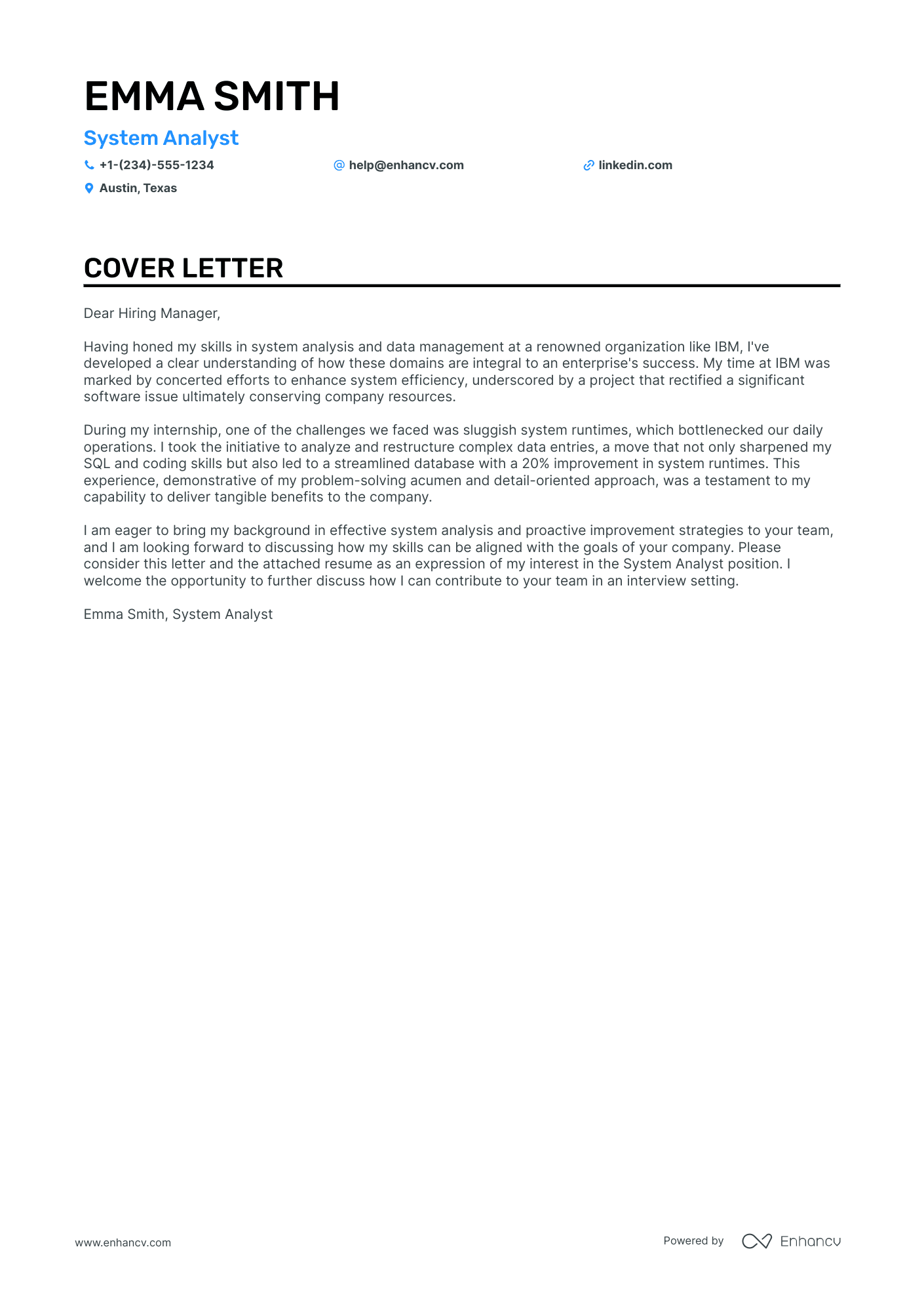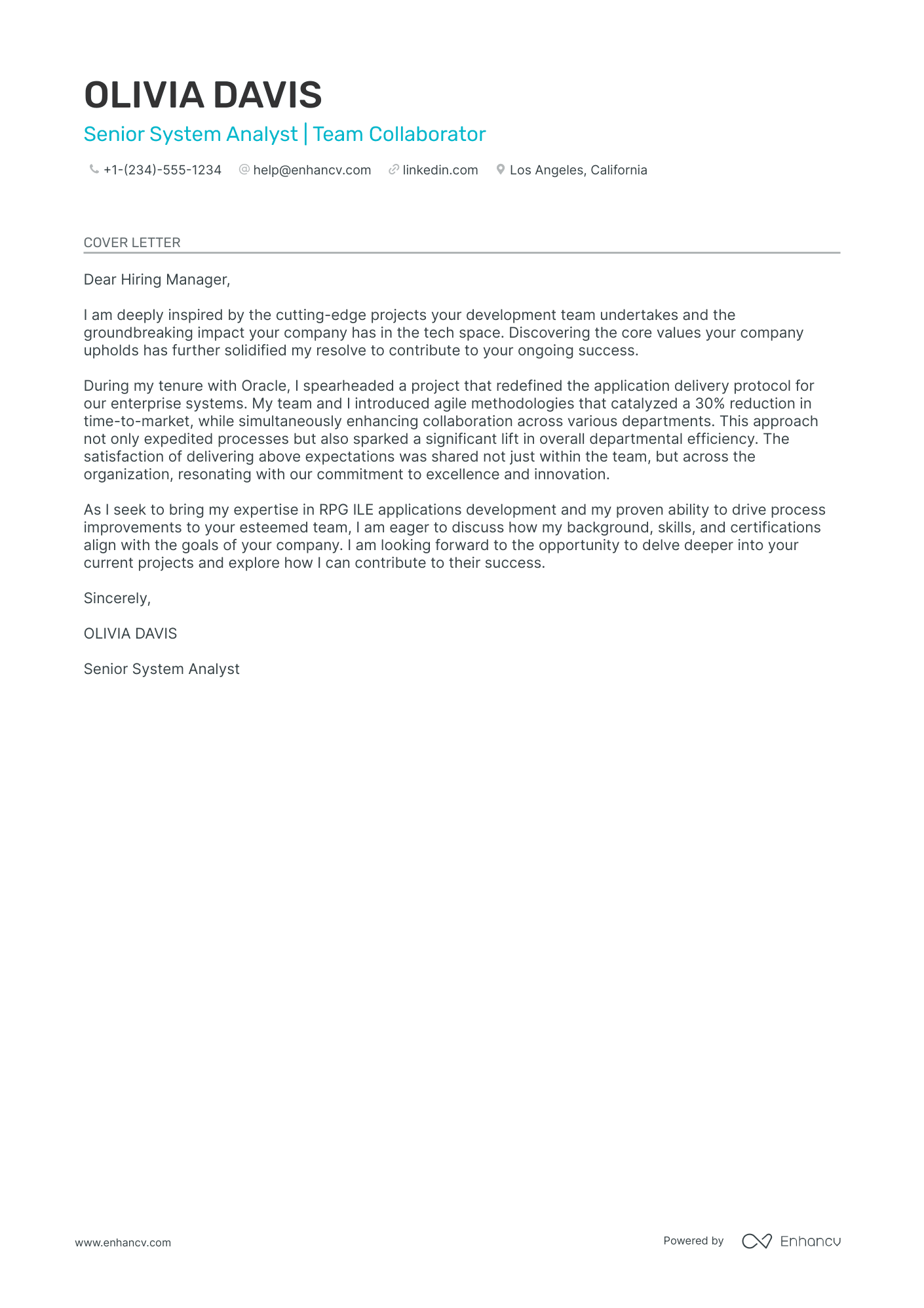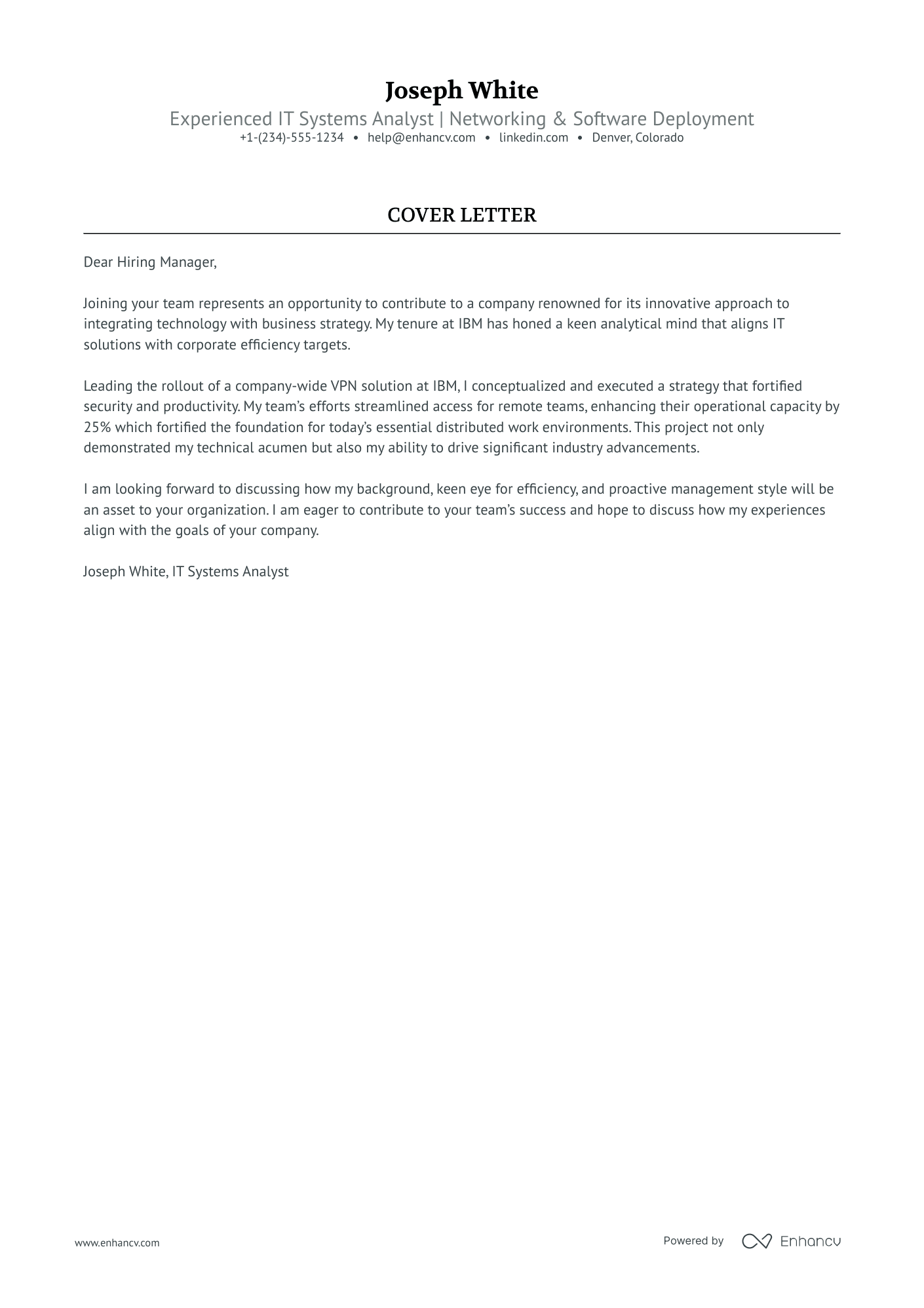Embarking on the job hunt, you've likely discovered a system analyst cover letter is your golden ticket to standing out. Unlike your resume, your cover letter is your stage to share the tale of your proudest professional achievement. Straying from clichés and keeping it to one compelling page, you can craft a narrative that's both formal and uniquely yours. Let's ensure your cover letter not only complements your resume but also captures the essence of your professional journey.
- Step your best foot forward in the system analyst cover letter introduction;
- Be inspired by other professionals' certified cover letters;
- Structure your system analyst cover letter to feature what matters most;
- Close off your system analyst cover letter to make a memorable impression on recruiters.
But where to start writing? Upload your resume into Enhancv's AI, which will prepare your system analyst cover letter (all you need to do is personalize it, and you'll be good to go).
If the system analyst isn't exactly the one you're looking for we have a plethora of cover letter examples for jobs like this one:
Drop your resume here or choose a file.
PDF & DOCX only. Max 2MB file size.
System analyst cover letter example
ELLA WHITE
Phoenix, Arizona
+1-(234)-555-1234
help@enhancv.com
- Highlighting Relevant Experience: The cover letter specifically mentions leading an EHR system integration project, which showcases leadership and project management skills in a healthcare technology context.
- Quantifiable Achievements: It cites metrics such as enhancing data accuracy by 25% and reducing software downtime by 15%, which helps the hiring manager gauge the candidate's impact on previous positions.
- Technical and Strategic Contributions: The candidate emphasizes the creation and implementation of custom reports for improved decision-making, demonstrating the ability to address and understand the unique needs of senior management within a healthcare setting.
- Expressing Eager Engagement: The cover letter expresses an eagerness to bring similar successes to the new role, a positive attitude that suggests a proactive and results-driven approach to workplace challenges.
The format of your system analyst cover letter: structure, fonts, margins, and more
Your system analyst cover letter should include a header (with your name, position, and date); a greeting and introductory paragraph; a body and closing paragraphs; and an optional signature.
Remember that you're writing your system analyst cover letter for recruiters - as the Applicant Tracker System won't scan this content.
Here are a few more tips and tricks to keep in mind when formatting your system analyst cover letter:
- Use the same font in your system analyst cover letter and resume. We recommend modern fonts, e.g. Lato and Rubik, to help you stand out, instead of the stereotypical Arial and Times New Roman.
- Each paragraph should have single spacing, which is already set up for you in our cover letter templates.
- Our cover letter builder follows industry standards for your system analyst cover letter formatting - with a one-inch margin, surrounding your content.
- Always export your system analyst cover letter in PDF to ensure the image or text quality stays the same and your writing isn't moved about.
Tight on time? Our free cover letter generator helps you create a cover letter instantly from your resume.
The top sections on a system analyst cover letter
- Header: This includes your contact information and the date, ensuring the recruiter knows how to reach you and that your application is timely.
- Greeting: Address the hiring manager by name to personalize your application and show attention to detail—a must for a system analyst.
- Introduction: Briefly state your interest in the system analyst position and your relevant experience, capturing the recruiter's interest and demonstrating your understanding of the role's importance.
- Body: Highlight specific examples of your system analysis experience, particularly your problem-solving skills and your ability to work with complex systems, as these are critical competencies for the job.
- Closing: Reiterate your enthusiasm for the role, invite further discussion, and thank the recruiter for considering your application, displaying your professionalism and effective communication skills which are key in a system analyst role.
Key qualities recruiters search for in a candidate’s cover letter
- Proficiency in systems analysis methodologies and modeling techniques, such as Unified Modeling Language (UML) or Business Process Model and Notation (BPMN), to effectively visualize and document system requirements and processes.
- Experience with requirements gathering and the ability to work closely with stakeholders to identify business needs and translate them into technical specifications, ensuring the development team understands the desired outcomes.
- Strong analytical and problem-solving skills to assess system capabilities, identify limitations, and propose innovative solutions that align with business goals and technical possibilities.
- Familiarity with database management and the ability to write and interpret complex SQL queries, which aids in understanding the data flow and storage needs of various systems.
- Knowledge of software development life cycle (SDLC) and project management principles, including Agile and Waterfall methodologies, to effectively collaborate with development teams and manage projects through to successful completion.
- Excellent communication and interpersonal skills, including the ability to produce clear documentation and the capacity to articulate technical concepts to non-technical audiences, fostering effective collaboration between IT and business units.
How to greet recruiters in your system analyst cover letter salutation
As the saying goes, "You never get a second chance to make a first impression."
Write your system analyst cover letter salutation to be more personalized to the actual hiring manager, who is set to assess your profile by:
- greeting them on a first-name basis, if you have previously communicated with them (e.g. "Dear Sam,");
- using their last name, if you have more formal communication or haven't spoken to them (e.g. "Dear Mr. Harrows" or "Dear Ms. Marshall");
- writing "Dear HR Team" or "Dear Hiring Manager", if you have no clue about who's recruiting for the role.
Search on LinkedIn, Google, or the company website to find information as to the recruiter's name.
In any case, avoid the impersonal "Dear Sir or Madam".
List of salutations you can use
- Dear Hiring Manager,
- Dear [Company Name] Team,
- Dear Ms. Smith,
- Dear Mr. Johnson,
- Dear Dr. Williams,
- Dear [Department Name] Director,
Introducing your profile to catch recruiters' attention in no more than two sentences
The introduction of your system analyst cover letter is a whole Catch 22 .
You have an allocated space of no more than just a paragraph (of up to two sentences). With your introduction, you have to stand out and show why you're the best candidate out there.
Set out on a journey with your system analyst cover letter by focusing on why you're passionate about the job. Match your personal skills and interests to the role.
Another option for your system analyst cover letter introduction is to show you're the ideal candidate. Write about how your achievements and skills are precisely what the company is looking for.
However you decide to start your system analyst cover letter, always remember to write about the value you'd bring about. Making it both tangible (with your metrics of success) and highly sought out.
How to write an achievement-focused system analyst cover letter body
We've got the intro and greeting covered. Now, comes the most definitive part of your system analyst cover letter - the body.
In the next three to six paragraphs, you'd have to answer why should recruiters hire you.
What better way to do this than by storytelling?
And, no, you don't need a "Once upon a time" or "I started from the bottom and made it to the top" career-climbing format to tell a compelling narrative.
Instead, select up to three most relevant skills for the job and look back on your resume.
Find an achievement, that you're proud of, which has taught you these three job-crucial skills.
Quantify your accomplishment, using metrics, and be succinct in the way you describe it.
The ultimate aim would be to show recruiters how this particular success has built up your experience to become an invaluable candidate.
Closing remarks to end your system analyst cover letter
Of course, you'll have to show gratitude to the recruiters, who have assessed your profile at the end of your system analyst cover letter .
A "Thank you for the consideration" would work wonders, instead of the standard "Sincerely yours".
Do you want to make an even better impression?
Close off your system analyst cover letter by promising how you see yourself excelling in the role and the positive impact you'd bring about.
A sentence that encourages some further action on the recruiter's end could also be a good way to close off the communication (e.g. provide your availability for an interview).
What to write on your system analyst cover letter, when you have zero experience
The best advice for candidates, writing their system analyst cover letters with no experience, is this - be honest.
If you have no past professional roles in your portfolio, focus recruiters' attention on your strengths - like your unique, transferrable skill set (gained as a result of your whole life), backed up by one key achievement.
Or, maybe you dream big and have huge motivation to join the company. Use your system analyst cover letter to describe your career ambition - that one that keeps you up at night, dreaming about your future.
Finally, always ensure you've answered why employers should hire precisely you and how your skills would benefit their organization.
Key takeaways
Writing your system analyst cover letter doesn't need to turn into an endless quest, but instead:
- Create an individual system analyst cover letter for each role you apply to, based on job criteria (use our builder to transform your resume into a cover letter, which you could edit to match the job);
- Stick with the same font you've used in your resume (e.g. Raleway) and ensure your system analyst cover letter is single-spaced and has a one-inch margin all around;
- Introduce your enthusiasm for the role or the company at the beginning of your system analyst cover letter to make a good first impression;
- Align what matters most to the company by selecting just one achievement from your experience, that has taught you valuable skills and knowledge for the job;
- End your system analyst cover letter like any good story - with a promise for greatness or follow-up for an interview.
System Analyst cover letter examples
By Experience
Entry Level System Analyst
Senior System Analyst
By Role







